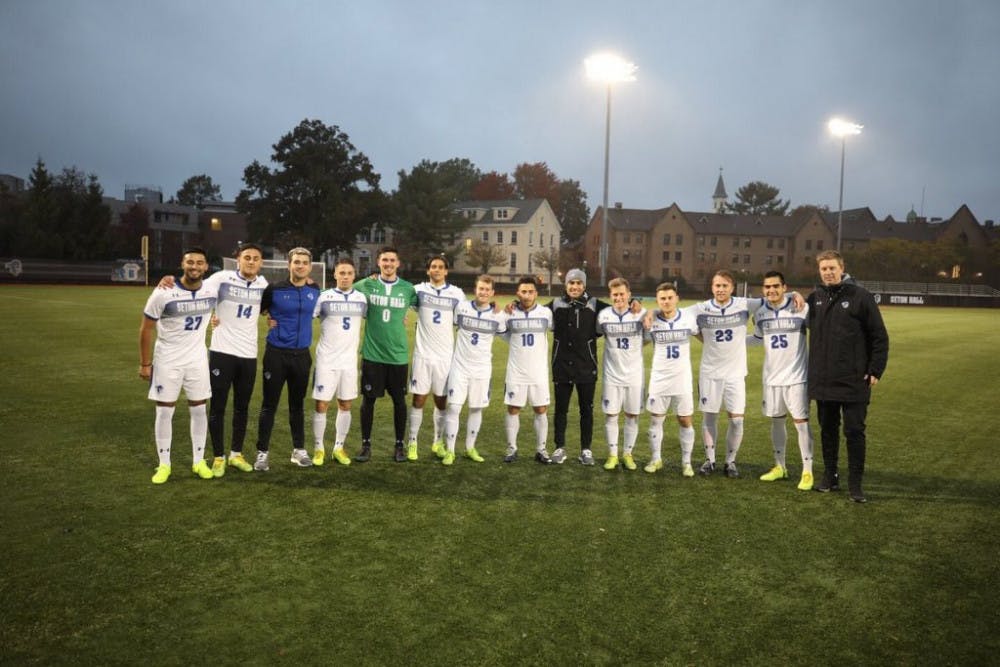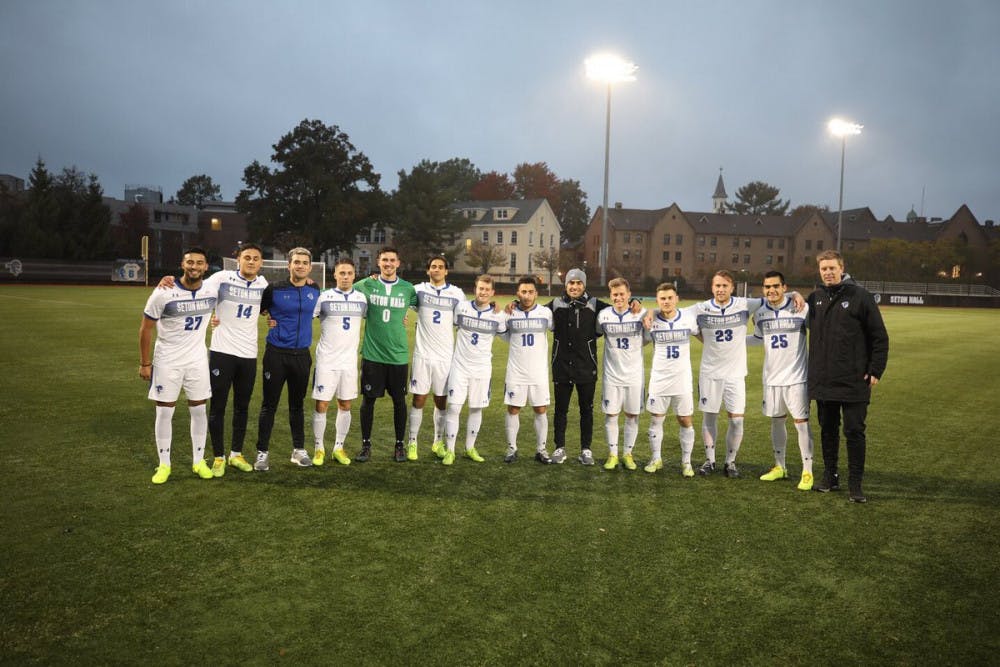SOUTH ORANGE, N.J. – Andreas Lindberg has a spring in his step as he walks through the wing of coaches’ offices in the heart of Richie Regan Recreation and Athletic Center. He makes the turn and moves toward his own work space, an area he has spent so little time in since the bitter end to his first season as Seton Hall men’s soccer head coach.
“I’m very disappointed with the year, you know, I think we could have done more…we were so close,” he said. “Except for Creighton and Georgetown, there’s not one team that I’m like, ‘This team’s better.’ Those two teams are better than us. Other teams must be better, but it’s just a little bit.”
The 42-year-old coach took some much-needed time off immediately after the Pirates’ emotional end to the season. He and his team had their collective hearts ripped out in the penultimate game of the season, when freshman forward C.J. Tibbling missed two potential postseason-clinching goals by inches, only to have opponents Xavier counter and score to eliminate Seton Hall from the six-team Big East Tournament.
The page turns with a full 11 pouring out their final ounces of eligibility last fall, a reality that demands another large influx of players for Lindberg, who brought in a colossal 20-player recruiting class in his first year.
Lindberg has never cut corners on recruiting, though. Ask any of his current or former players, and his scouting and nurturing will, more often than not, be the first thing brought up. Whether it takes several trips to multiple continents and the sacrifice of being away from his family for weeks on months, Lindberg will do it. He has to.

“Players play, man,” he said. “Got to get the players, have to. And it’s not, it’s not easy.”
Lindberg walks into his office and points toward the tea kettle, tucked between his black leather couch and the wall. As the water boils, he takes orders, with Green Tea and English Breakfast among the options. Once the tea is ready, he opens a container of locally-farmed Harbes Honey, from the North Fork of Long Island, where the former LIU-Post head man still resides.
“I’ll have to get another one later this spring,” he said.
The wide-ranging conversation jumps from last season to overall philosophy, but the main focus is Lindberg and his staff’s globetrotting effort to find talent. As he sits down to talk, one of his assistant coaches, Jeff Matteo, is in France pursuing prospects. Newly-acquired assistant Ali Simmons, who walks in during the conversation, will leave later in the day for Germany, the Netherlands and England.
Justice: What’s it like when you go on those recruiting trips around the world. I know you got to take in some games this winter. What is it like, just that whole experience?
Lindberg: Yeah, look, I mean, I’m trying to be somewhat active on social media and share some of the stuff. But it’s like [when] you have a kid, you don’t share when he pooped his pants or threw up and was sick, you share when he was able to bike the first time or stand up, it’s the same with recruiting.
Justice: You share the glamorous stuff…
Lindberg: Yeah, like, that’s the stuff you share on social media. Like, ‘Oh, man, he went to Brazil and to Argentina and he got to see Boca and River Plate.’ And I’m like, “Yeah, that’s all great…it’s hard work.”
You’re on a plane for like 11 hours to get there, sitting in a tight Uber for like 45 minutes, you don’t really know where you’re going. I don’t speak the language, you know? And then there’s like three, four games in a row. Sometimes you go and the player is not good enough. Like, one specific player in Brazil I was going to watch, he was injured, so that was a bit of a bust.
Justice: When you’re there, do you take notes, do you just watch? Are you able to get any type of tape for some of these games?
Lindberg: Yeah, but, it’s twofold. In some cases, you go to specific games or specific showcases or specific practices to watch specific kids. Like, it’s already been screened, you know where they stand academically, might know what the range is financially, what they can afford to pay. And then, seen videos, done all your research and now we’re going specifically to watch a player.
Then [conversely], there is, you know, a showcase, when there’s 200 kids and 60 coaches. And, now, you might not know much. [It’s] like going into a candy store and seeing if there’s anything you like. And you’re like, “Oh, I like this guy.”
And then, you’re trying to do the reverse, like, what’s the academic situation, what’s the financial situation, eligibility, all those things, and it might not be a fit. You might say like, “This is the greatestguy, I’d love to have this kid,” and he doesn’t speak English, or, doesn’t meet the NCAA requirements, or, they need too big of a scholarship and we don’t have it, or, it’s not in a position that we’re looking for.
Justice: How quickly do you allow yourself to make a judgement? Are there times when you sit down, see five minutes and you’re like, ‘No,’ or, ‘Yes.’ Maybe not ‘yes’ –
Lindberg: The “no” you can say really quick. The “no” you can say, most of the time, really, really, really quick, like, you just know. Like, one of those things, I think if you’ve been in the profession, you just know, the “no’s.”
The “yes’s,” sometimes you could take [time], you’re not really sure. Those are the tricky ones. That’s when you can make a mistake, like, you’re not really sure. Could pan out, works out great, or, s---, this was a mistake.
Justice: What do you feel like is the best recruiting story you have? … Take that whatever way you want.
Lindberg: I’ve got some really good stories [laughs and sips his tea]. I have some good stories. I have one from [LIU] Post that was really, really good. I had $5000 left in my budget to spend – Ali, you’ve got to listen to this one.
Five-grand left to spend, and like 50-grand [for tuition], so 10 percent of a scholarship left. And, I have a contact in Norway who pitched me a player. I’m like, this looks really interesting, right? So, got the tape, looks good, called some people, watching, blah, blah, blah. I’m like, you know what, I’m going to go for it. “Hey, listen, I’ve got a fairly-good academic scholarship. So, listen, first year I only have $5000 to give you, that’s all I can do.” He goes, “Yeah, you know, sorry but, not going to be enough for me.” I’m like, “Ok, fair enough, I understand, good luck to you.”
So, next day I offer the $5000 to a Scottish guy, off a video…whatever, kind of wasn’t too keen on him – we’re talking July, preseason was like two weeks away. The Norwegian player called me back the next day and was like, “So, what’s the next step?” I’m like, “What do you mean? You said no.” “[He said] Oh, yeah, you know, just trying to see if there’s more money, trying to negotiate if there was more money.”
I said, “I’m sorry, but, there isn’t and I just gave your money away to somebody else, that $5000 I don’t even have that.” He goes, “Oh, OK, alright…I’m coming anyways.” So, I’m like, “OK, great!” Ended up being a first team All-American.
So, by his second year, I hooked him up, got a full tuition. But, for the first year, kind of paid his own way and became a first team All-American [his senior year].
Justice: Can you say who it was?
Lindberg: Yeah, Per Forgaard.
And, it’s funny because, I was just in Norway for a recruiting trip in December, and – because his brother ended up coming and playing for me at Post – I saw them for the break and went out, had pizza, whatever, talking about the story, everybody knew.
Justice: Boiling all of this down, what do you feel like is the most important trait for a player to have coming into your program?
Lindberg: They’re good. … I mean, you know, I’ve been talking about that the last couple days. You have to have the ability; the ability needs to be there. You need to be a good player, if they’re not a good player, a lot of the other variables kind of get tossed, right?
But, yeah, that’s part of recruiting, it’s just difficult. I like to have players that are competitive, you know, likes to compete. Good people…makes it easier, makes it more fun, and I think it creates an environment where the people want to work in and the players get together. It’s been a little part of our struggles too, trying to get the team cohesiveness, which takes a while. I inherited players, brought in my own guys, brought in Band-Aids – one-year guys.
A lot of waves when I came, right? And, need to get those down a little bit. But, having good people, that’s key.
James Justice can be reached at james.justice@student.shu.edu or on Twitter @JamesJusticeIII.





